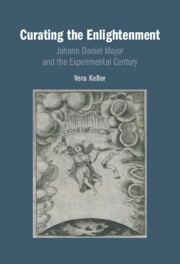Book contents
- Curating the Enlightenment
- Curating the Enlightenment
- Copyright page
- Dedication
- Contents
- Figures
- Acknowledgments
- Part I Introduction
- Part II Approaches to Knowledge
- 3 The Making of the Research Scholar
- 4 The History of Learning and Research Infrastructures
- Part III Reworking Disciplines
- Part IV Spaces of Knowledge
- Part V Conclusion
- Bibliography
- Index
3 - The Making of the Research Scholar
from Part II - Approaches to Knowledge
Published online by Cambridge University Press: 07 December 2024
- Curating the Enlightenment
- Curating the Enlightenment
- Copyright page
- Dedication
- Contents
- Figures
- Acknowledgments
- Part I Introduction
- Part II Approaches to Knowledge
- 3 The Making of the Research Scholar
- 4 The History of Learning and Research Infrastructures
- Part III Reworking Disciplines
- Part IV Spaces of Knowledge
- Part V Conclusion
- Bibliography
- Index
Summary
Late seventeenth-century scholars sought to distinguish themselves from the stereotype of an academic pedant. They developed a new model of a scholar who was "prudent" or "gallant," that is, witty, strategic, fashionable, and judicious in career choices and areas of focus and able to perform fluently in mixed and noble audiences. They aimed to establish their reputations as celebrities by attracting attention in popular genres such as vernacular periodicals. Historians have recently identified this new model as an ancestor of the research scholar. Early modern academics constructed this model in contrast to the stereotype of doctrinaire bookworms committed to a priori systems. Prudent and gallant scholars embraced the change of knowledge over time. From a position of deep ignorance, they nevertheless dared to frame conjectures that might be disproven. They pivoted quickly in response to new evidence and varying audiences. Major exhibited these ideals in his vernacular science fiction, Voyage to a New World without a Ship or a Sail, and in his adoption of Fama (fame or rumor) as his personal brand.
Keywords
- Type
- Chapter
- Information
- Curating the EnlightenmentJohann Daniel Major and the Experimental Century, pp. 63 - 87Publisher: Cambridge University PressPrint publication year: 2024

